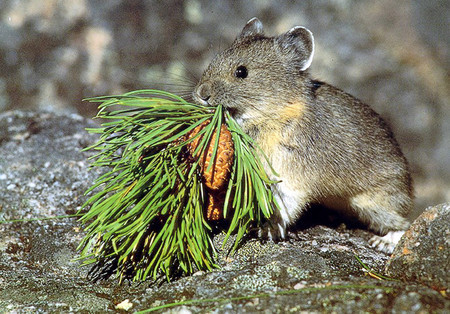American pika won’t get protection despite climate change risk
Climate change might be wiping out some populations of the American pika, a relative of the rabbit, but not enough to warrant legal protection for the tiny mountain-dwelling animal that lives in Nevada and nine other Western states.
In a conference call Friday, U.S. Fish and Wildlife Service officials said they don't believe the pika is in danger of extinction in the foreseeable future, although global warming is the primary threat to the species.
"We know they have responded to climate change in the historical past," said John Isanhart, a Service biologist in Salt Lake City.
The pika lives in parts of California, Colorado, Idaho, Montana, Nevada, New Mexico, Oregon, Utah, Washington and Wyoming.
In Nevada, where pika populations are most at risk, they are found in the northwest part of the state in the White Mountains, Bodie Hills, Hays Canyon Range and Sheldon National Wildlife Refuge.
They also are in central Nevada in the Desatoya, Shoshone, Toiyabe, Toquima, Monitor and White Pine ranges as well as in the Ruby Mountains and East Humboldt Range.
They have been documented at 31 locations in Nevada.
The wildlife service posted its decision on a Web site stating that while some pika populations in the West are declining, others are not, so it would not extend Endangered Species Act protections.
The pika would have been the first animal in the continental United States listed because of the effects of global warming.
Although potentially vulnerable to climate change in some parts of its range, pikas will have enough high-elevation habitat to prevent extinction, the agency said.
"We acknowledge there is going to be some decline at some locations, but the pika is widespread enough, across a range of habitat, that it appears it would not threaten the long-term survival and existence of the species," said Larry Crist, supervisor of the U.S. Fish and Wildlife Service office in Utah.
Greg Loarie, an Earthjustice attorney who worked on lawsuits pressing for protections for the pika, said science clearly points toward dramatic reductions in populations in the coming decades because of warming temperatures.
"To conclude this species is not threatened by climate change strikes me as an impossible gamble," Loarie said.
The pika lives mostly in high, rocky mountain slopes. They are well-suited for alpine conditions, but they move higher as temperatures warm.
In some places, the pika has run out of room to run and populations have disappeared, scientists said. Even brief exposure to temperatures of 78 degrees or warmer can cause death.
A 2003 study found six of 25 pika populations in the Great Basin, which stretches across Nevada and into surrounding states, had disappeared, primarily because of warming temperatures.
The Center for Biological Diversity petitioned the government in 2007 to protect the pika. Shaye Wolf, a biologist with the group, called the Service's decision a political one that ignores both the law and the dire circumstances facing the pika.
Las Vegas Review-Journal writer Keith Rogers contributed to this report.

















